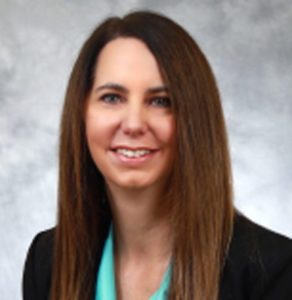 Jennifer Tokash
Jennifer Tokash
Director, Indirect Category Management
OhioHealth
Columbus, Ohio
Jennifer Tokash grew up knowing she would be the first one from either side of her family to graduate from a four-year college. That’s because her father, Jim, a metallurgist until his retirement, and her mother, Paulette, an office manager for a trucking company are “two amazing people,” she says. “Because of their encouragement, they instilled in me a sense that I could do anything I set my mind to.” Of course, she knew she’d have to work hard, and she credits her parents for that bit of information too. “They really ingrained that work ethic in me,” she says.
Born in New Jersey and raised in New York and West Virginia, Tokash did indeed go to college – Marshall University in Huntington, West Virginia. “I almost fell into economics there,” she says. “I was good at math, though I didn’t want to go into finance.”
She worked in various contracting and strategic sourcing roles before getting her start in healthcare in 2004, when she became supplier relations manager for Cardinal Health.
“As my healthcare career progressed, I gained an understanding of how the distribution model contributed to providers in their mission to deliver exceptional patient care,” she says. For two years she was a sourcing executive at Vizient, and in 2012, she joined OhioHealth as manager of procurement operations. Today, as director of indirect category management, she has responsibility for purchased services, IT and capital.
“Working for OhioHealth and seeing the provider perspective, I feel a deep connection to the mission of patient care. Everyone at OhioHealth plays an important role in caring for our patients, and it’s extremely rewarding to know your work helps make a difference.”
Describe a key mentor or event in your life.
“I’m blessed to have parents that are always so supportive and my biggest cheerleaders,” says Tokash. “I’m grateful to them for empowering me to do more than I thought possible and instilling in me a great work ethic. Additionally, I have an amazing husband, Mike, who has great compassion and ability for being steadfast in living by values and priorities, which has helped me also shape my own leadership vision.
“I’ve also been blessed to have worked with amazing leaders at OhioHealth, in particular, my director, Jamie Yolles. She has been a great mentor and role model of compassionate leadership, and she has encouraged me to work outside my comfort zone as a way to enhance my leadership skills. She was very supportive in my move to procurement manager, and her coaching and feedback were instrumental as I began to take those first steps in leading a large department.
In what way(s) are you a better supply chain leader than you were, say, five or 10 years ago?
For Tokash, leadership means “leading and empowering team members, building communication skills to influence others’ openness to transformational change, learning to move from tactical operations to strategic thinking, creating an organizational vision, and inspiring others to understand the importance of the work they do in support of the organization and its goals.”
Her experience as procurement manager has helped her become a formal leader, and her current role as director of indirect category management has taught her about the importance of building formal and informal networks to accelerate results.
In her current role, Tokash has “embraced the Lean Innovation culture we’re building at OhioHealth, which will further empower our associates,” she says. In the Lean environment, formal leaders don’t solve problems on their employees’ behalf so much as they challenge associates to be creative in finding their own solutions to problems. “It has helped elevate us as leaders and elevate talent development in the organization.”
Describe the key characteristics of the successful supply chain leader of the future.
“Compassionate leadership, emotional intelligence and the ability to drive and support innovation will continue to be key characteristics of a successful supply chain leader,” says Tokash. “The ability to empower others, encourage innovative thinking and coach teams to embrace change are important to continue driving healthcare forward and for developing the leaders of the future.”
